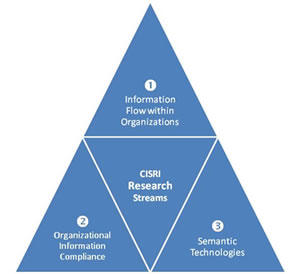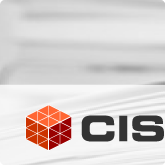|
CISRI aims to be a hub for pioneering research in the field of information science. With expertise and research drawn from a range of academic disciplines such as cognitive science, business science, semantics and linguistics, the Institute offers a truly interdisciplinary perspective. This diverse knowledge base provides CISRI with a unique approach that will take information science research in new directions.
Information science is a broad discipline which deals with human and technological aspects of information collection, organization, preservation, and retrieval. To provide focus on specific information-related issues while encouraging collaboration between researchers from different scientific horizons, CISRI has been organized into three specific research streams that will guide our researchers and partners.
These streams have been devised following an in-depth analysis of issues and pain points related to information management in both public and private sectors. They focus on the ways in which information interacts with organizational and regulatory structures, how these interactions affect information systems’ effectiveness and efficiency, as well as the role that new semantic technologies can play in information management practices and technologies. This division of research streams will help our diverse body of researchers to each offer their own specialized contributions in terms of knowledge, connections, and resources.

1.INFORMATION FLOW WITHIN ORGANIZATION
The ‘Information Flow within Organizations’ research stream investigates the relationship between the flow of information within organizations and the structure of those organizations. Specifically, research within this stream considers how the particular structure of an organization influences its information flow and, in turn, how its internal flow of information influences the nature and behaviour of the organization.
Organizations are composed of many different structural components. When combined and connected through the exchange of information, these components enable an organization to act cohesively and collectively to achieve organizational goals. Recently, organizations of all kinds have expressed growing interest in how their internal structure (i.e. organizational chart structures, reporting hierarchies, decision-making mechanisms, etc.) affects their flow of information. By investigating the relationship between patterns of information flow and organizational behaviour, researchers in this field are discovering new ways to promote communication, decision-making and effective goal-directed action within organizations.
Researchers within this stream consider questions such as:
- -How does information flow through organizations—what are the different patterns of information flow?
- -What are the mechanisms that allow information to flow through an organization?
- -How do other properties of an organization influence and determine its information flow?
- -Conversely, how does information flow influence the properties of an organization?
- -How does the flow of information affect decision making within an organization?
Research findings in these areas will in turn be applied to questions within other CISRI research streams that relate to the organization of information and the design of human-information systems. By better understanding the relationship between organizations, information, and organizational behaviour, researchers within this stream will help to bridge the gap between theoretical research and pragmatic application.
2.ORGANIZATIONAL INFORMATION COMPLIANCE
Information compliance is a growing challenge for private and public sector organizations whose competitiveness depends on the fulfillment of various regulatory and performance requirements.
The ‘Organizational Information Compliance’ research stream focuses on information as a valuable asset for organizations competing in regulated environments. The following questions are considered within this stream:
- -What are the core concepts, key aspects and future evolutions of “information compliance” for organizations?
- -What are the nature and qualities of information as an indicator of compliance?
- -How can information structures such as taxonomies, ontologies and classification schemes be leveraged to meet organizational compliance?
- -How can policy-based records management practices be aligned with information, records and content management systems to effectively fulfill compliance requirements?
- -How can information compliance be applied systematically without user intervention?
The results of this research are expected to directly contribute to the improvement of information management practices in public and private organizations, which are becoming increasingly reliant on a large and growing body of digital content. By improving, streamlining, and automating as many information management practices as possible, organizations can maximize their efficiency and effectiveness. A better understanding of the relationship between information and the ever-growing compliance requirements for organizations will also help software designers to improve information management technologies.
3.SEMANTIC TECHNOLOGIES RESEARCH
The ‘Semantic Technologies’ research stream focuses on understanding how information systems can benefit from “semantically aware” technologies—that is to say, technology that is able to see beyond the surface of informational content and understand its underlying meaning and purpose. Information systems can generally benefit from the use of semantic technologies by reducing the amount of human intervention required in a large number of domains.
This research stream focuses on the development of such technologies to aid organizations in managing, organizing and discovering information and knowledge. Researchers within this stream consider questions such as:
- -How can patterns of information flow be automatically discovered from the data produced by and stored in information systems?
- -How can information be collected and organized to ensure that all information relevant to a task or goal is readily available and usable for individuals whenever required?
- -How can information be better organized to support the process of information discovery, such as that required by legal requests?
- -How can the day-to-day information management tasks performed by users of information systems be automated?
A key goal of this research stream is to build a set of technological tools that can provide a semantic infrastructure capable of supporting an enterprise-scale information architecture. These tools will allow organizations to better navigate all aspects of their information systems, including structural, unstructured and tacit knowledge stored in many different formats and repositories. New discoveries and advances in this field will provide the foundation for a more effective approach to knowledge creation and management.
|


